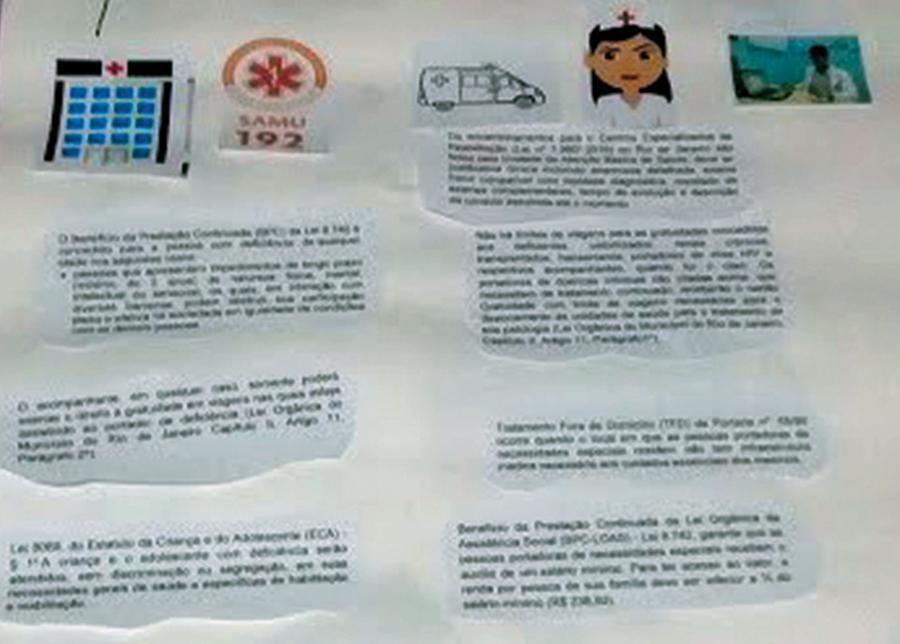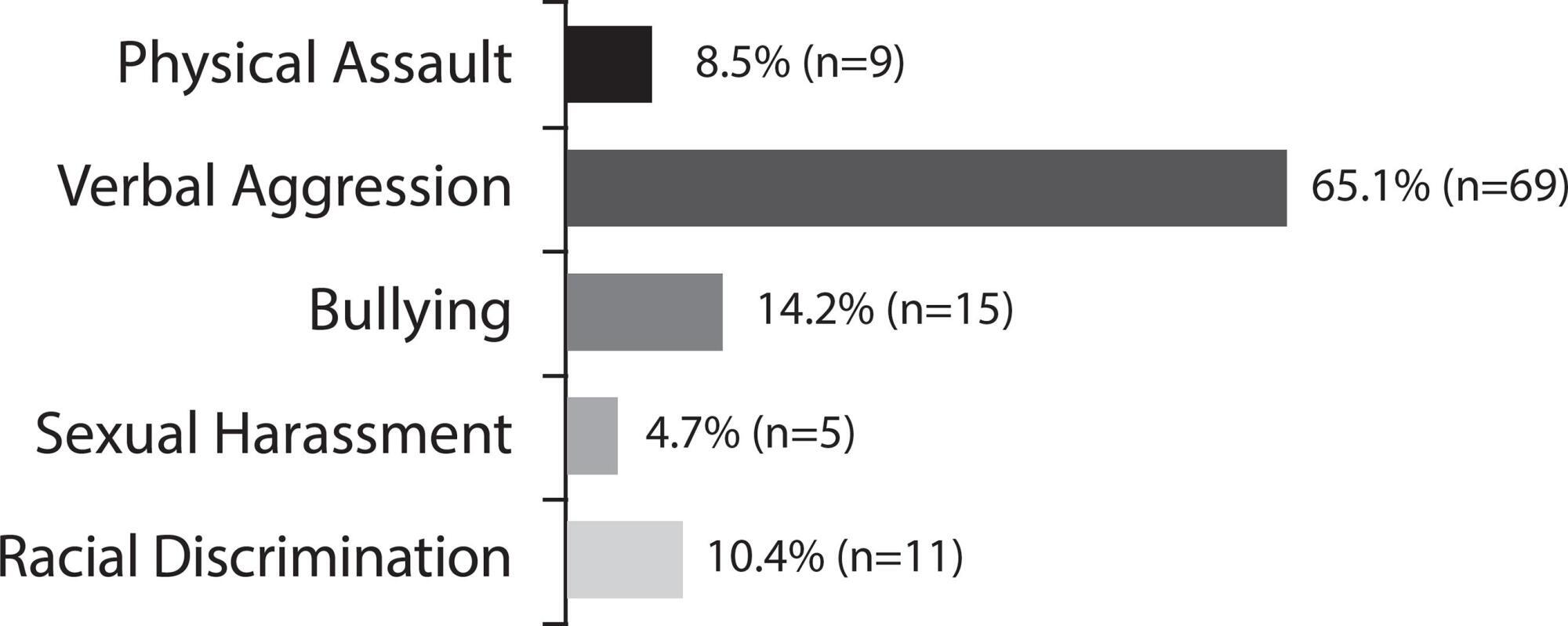-
Learning needs of Nursing students in technical vocational education
Revista Brasileira de Enfermagem. 2015;68(1):20-25
01-01-2015
Abstract
Learning needs of Nursing students in technical vocational education
Revista Brasileira de Enfermagem. 2015;68(1):20-25
01-01-2015DOI 10.1590/0034-7167.2015680103i
Views0See moreObjective:
identify learning needs of students of Technical Vocational Education (TVE) in Nursing. Qualitative study conducted in a city of São Paulo state.
Method:
the subjects were students, teachers and coordinators of TVE and students of the bachelor degree who have had contact with TVE. Data collection was performed by questionnaire socioeconomic and cultural circles about the learning needs. For data analysis we used the content analysis.
Results:
it was found that students have difficulties contents not related to nursing as portuguese and mathematics, as well as introductory courses in the course of TVE which possibly may interfere negatively in learning specific content of nursing and the quality of health care.
Conclusion:
it is necessary to rethink the content taught and ways to teach from basic education, as well as the training of teachers who now works in the TVE.
-
Serious game e-Baby: nursing students’ perception on learning about preterm newborn clinical assessment
Revista Brasileira de Enfermagem. 2015;68(1):13-19
01-01-2015
Abstract
Serious game e-Baby: nursing students’ perception on learning about preterm newborn clinical assessment
Revista Brasileira de Enfermagem. 2015;68(1):13-19
01-01-2015DOI 10.1590/0034-7167.2015680102i
Views0See moreObjective:
to evaluate students opinion regarding e-Baby educational technology.
Methodology:
exploratory descriptive study in which participated a sample composed of 14 nursing Portuguese students that used e-Baby digital educational technology in an extracurricular course. To achieve the aim of the study, the data collection was realized through an opinion instrument in Likert scale including the possibility of commentaries by students. Is was also collected data of participants’ characterization.
Results:
students made very satisfactory evaluations regarding the game e-Baby, varying since usability acceptation through suggestions of expansion of the game to other nursing themes.
Conclusion:
serious game e-Baby can be considered a didactic innovation and motivator tool of learning. Besides, it demonstrates have adequate interface in design and educative function aspects, evocating intense interaction between user and computational tool.

-
EDITORIAL
Challenges beyond the scientific knowledge production
Revista Brasileira de Enfermagem. 2015;68(1):7-8
01-01-2015
Abstract
EDITORIALChallenges beyond the scientific knowledge production
Revista Brasileira de Enfermagem. 2015;68(1):7-8
01-01-2015DOI 10.1590/0034-7167.2015680101p
Views0For several decades, innumerous appeals and reflections on how to build the nursing science and achieve visibility in the scientific world led researchers to make efforts to produce knowledge that contributed to the well-being of people, improving their quality of life, relieving their suffering and transforming the reality in which we live. In addition to […]See more
-
ORIGINAL ARTICLE
Risk and protective factors for sudden infant death syndrome
Revista Brasileira de Enfermagem. 2020;73(2):e20190458
03-30-2020
Abstract
ORIGINAL ARTICLERisk and protective factors for sudden infant death syndrome
Revista Brasileira de Enfermagem. 2020;73(2):e20190458
03-30-2020DOI 10.1590/0034-7167-2019-0458
Views0See moreABSTRACT
Objectives:
To verify the occurrence of the risk and protective factors for sudden infant death syndrome during nursing consultation.
Methods:
Retrospective cohort study conducted based on medical records from a primary care unit in the municipality of São Paulo. The sample consisted of 63 infants assisted from January to December 2016.
Results:
The average age of infants was 3.2 months. The main risk factors identified were the presence of soft objects in the crib (93.6%) and bed sharing (58.7%). Predominant protective factors were breastfeeding (95.2%) followed by updated immunization (90.5%).
Conclusions:
Risk and protective factors for sudden infant death syndrome were identified in the study sample, indicating the importance of addressing the issue with families of children under 1 year of age to prevent the occurrence of such events.
-
ORIGINAL ARTICLE
Physical violence and verbal abuse against nurses working with risk stratification: characteristics, related factors, and consequences
Revista Brasileira de Enfermagem. 2020;73:e20190882
12-21-2020
Abstract
ORIGINAL ARTICLEPhysical violence and verbal abuse against nurses working with risk stratification: characteristics, related factors, and consequences
Revista Brasileira de Enfermagem. 2020;73:e20190882
12-21-2020DOI 10.1590/0034-7167-2019-0882
Views0See moreABSTRACT
Objective:
to analyze the characteristics, related factors, and consequences of physical violence and verbal abuse against nurses working with risk stratification.
Methods:
a cross-sectional, descriptive and quantitative study carried out with 80 nurses who work with risk stratification in emergency services. Data were collected using an adapted instrument and analyzed using (uni)bivariate inferential statistics.
Results:
companions were the main perpetrators of verbal abuse (86.1%); and patients inflicted physical violence (100%). Professionals with up to five years of experience are 74% less likely to suffer physical violence (p=0.029). Women suffer 5.83 times more verbal abuse than men (p=0.026). Sadness (15.8%) and fear of the aggressor (15.3%) were the main consequences of verbal abuse; and fear of the aggressor (22.2%) and stress (22.2%) were results of physical violence.
Conclusion:
violence is influenced by institutional, professional and client aspects. Therefore, coping with it requires multidimensional strategies.

-
ORIGINAL ARTICLE
Educational demands of family members of children with special health care needs in the transition from hospital to home
Revista Brasileira de Enfermagem. 2020;73:e20190156
07-31-2020
Abstract
ORIGINAL ARTICLEEducational demands of family members of children with special health care needs in the transition from hospital to home
Revista Brasileira de Enfermagem. 2020;73:e20190156
07-31-2020DOI 10.1590/0034-7167-2019-0156
Views0See moreABSTRACT
Objectives:
to analyze the educational demands of family members of children with special health care needs in the transition from hospital to home
Methods:
qualitative research conducted between February and June 2018, using the handbook on creativity and sensitivity dynamics, from the sensitive creative method; the participants were nine family caregivers of children admitted to a public hospital in Rio de Janeiro; the data were subjected to French discourse analysis
Results:
the educational demands were clinical, centered on the categories complex and continuous care, technological care, modified habits, medication, development and mixed care, and social, related to the supplies and rights of children
Final Considerations:
the social educational demand has emerged as a new demand to be incorporated in the care of these children. The transition from hospital to home should be progressive and have the nurse as its coordinator, with the objective of providing participatory, safe, quality care, articulated within a social network

-
REVIEW
Authentic leadership in the educational system and in nursing education: an integrative review
Revista Brasileira de Enfermagem. 2022;75(1):e20220122
09-19-2022
Abstract
REVIEWAuthentic leadership in the educational system and in nursing education: an integrative review
Revista Brasileira de Enfermagem. 2022;75(1):e20220122
09-19-2022DOI 10.1590/0034-7167-2022-0122
Views0See moreABSTRACT
Objectives:
to identify and analyze the knowledge produced in literature about authentic leadership in the educational system, as well as in nursing education.
Methods:
an integrative review, carried out in the Scopus, Web of Science, CINAHL, MEDLINE/PubMed, ERIC, LILACS databases. Articles that addressed authentic leadership in the educational system from a general perspective and within the nursing scope, as well as teaching practices of this leadership model, were eligible.
Results:
twenty-three articles met the inclusion criteria, most published in 2019, highlighting studies in the context of teaching, with a predominance in the nursing course and which were synthesized into three thematic categories.
Final Considerations:
it was found that the higher the levels of authentic leadership in the educational system, the higher the rates of other positive factors related to it, such as trust, involvement, academic optimism, responsibility, creativity, among others.

-
ORIGINAL ARTICLE
Social and obstetric inequalities and vaccination in pregnant women
Revista Brasileira de Enfermagem. 2020;73:e20190099
07-31-2020
Abstract
ORIGINAL ARTICLESocial and obstetric inequalities and vaccination in pregnant women
Revista Brasileira de Enfermagem. 2020;73:e20190099
07-31-2020DOI 10.1590/0034-7167-2019-0099
Views0See moreABSTRACT
Objectives:
to analyze the association of socioeconomic level and obstetric characteristics with vaccine registration of pregnant women.
Methods:
cross-sectional study, performed with 480 women in puerperal. Vaccination of pregnant women was considered a dependent variable and as independent variables were age, skin color, education, steady union, paid work, and number of prenatal consultations. Association between variables was verified by the Poisson’s regression model.
Results:
from 480 pregnant women’s health cards, 10.63% had information on hepatitis B vaccination; 31.46% for tetanus; and 90% of the health cards had not register for influenza. There was an association of paid work and number of prenatal consultations with hepatitis B vaccination.
Conclusions:
lower percentages in absence of vaccination occurred in women who were in the job market and had a higher number of prenatal consultations. This suggests that socioeconomic inequalities may interfere with the vaccination of pregnant women in health services.
-
EXPERIENCE REPORT
Care management in coping with COVID-19 at a teaching hospital
Revista Brasileira de Enfermagem. 2021;74:e20200970
06-11-2021
Abstract
EXPERIENCE REPORTCare management in coping with COVID-19 at a teaching hospital
Revista Brasileira de Enfermagem. 2021;74:e20200970
06-11-2021DOI 10.1590/0034-7167-2020-0970
Views0ABSTRACT
Objective:
to report the experience of implementing care management strategies in coping with the COVID-19 pandemic in a teaching hospital.
Method:
this is an experience report of the managers who work at the largest public hospital in Paraná with functions as Head of the Care Management Division, Head of the Care Lines Management Sector, Head of the Infectiology Unit and support team.
Results:
care management strategies were structured based on the service dynamics; physical structure; human Resources; professional and user safety.
Final considerations:
preparing for a pandemic involves measures that include modifying infrastructure and processes, managing employees and users, infection prevention strategies, and clinical recommendations. These measures are necessary to optimize the quality of care provided to users with COVID-19 and to reduce the risk of viral transmission to other users or health professionals.
Keywords:BetacoronavirusCoronavirus InfectionsHealth AssistanceHealth ManagementHealth Services AdministrationSee more -
ORIGINAL ARTICLE
Workplace violence types in family health, offenders, reactions, and problems experienced
Revista Brasileira de Enfermagem. 2020;73:e20190055
06-01-2020
Abstract
ORIGINAL ARTICLEWorkplace violence types in family health, offenders, reactions, and problems experienced
Revista Brasileira de Enfermagem. 2020;73:e20190055
06-01-2020DOI 10.1590/0034-7167-2019-0055
Views0See moreABSTRACT
Objective:
to identify the types of violence that affect the health team in Family Health Units, their offenders, reactions and problems experienced by workers.
Method:
a cross-sectional, concurrent mixed-type research. The Survey Questionnaire Workplace Violence in the Health Sector was applied to 106 workers from Family Health Units. Of these, 18 answered the semi-structured interview.
Results:
verbal aggression (65.1%), bullying (14.2%), racial discrimination (10.4%), physical assault (8.5%) and sexual harassment (4.7%) were prevalent. Patients were the main perpetrators of verbal aggression (79.4%) and bullying (46.7%). Workers responded by telling co-workers and reporting to the boss. Victims remained over-alert, vigilant and tense, relating exposure to violence to absenteeism and the desire to leave the profession.
Conclusion:
verbal aggression is the most common violence with negative impact on workers’ health and work performed.

-
ORIGINAL ARTICLE
Teaching in health residencies: knowledge of preceptors under Shulman’s analysis
Revista Brasileira de Enfermagem. 2020;73(4):20180779
06-08-2020
Abstract
ORIGINAL ARTICLETeaching in health residencies: knowledge of preceptors under Shulman’s analysis
Revista Brasileira de Enfermagem. 2020;73(4):20180779
06-08-2020DOI 10.1590/0034-7167-2018-0779
Views0See moreABSTRACT
Objectives:
to understand how the pedagogical knowledge that integrates the basic knowledge of teaching is perceived by preceptors in residents’ teaching-learning process.
Methods:
a qualitative research conducted by semi-structured interview from December 2013 to July 2014, with 31 preceptors of residency programs of three university hospitals in northeastern Brazil. For analysis, the Grounded Theory’s proposal was used and supported by Atlas ti(r) 7.0 software.
Results:
preceptors integrate preceptorship with basic teaching knowledge proposed by Lee Shulman, with emphasis on General Pedagogical Knowledge when seeking strategies to better work on specific and disciplinary content, and Pedagogical Content Knowledge when adapting content to make it comprehensible to residents.
Final Considerations:
the study allowed us to understand how Shulman’s basic knowledge of teaching is perceived by preceptors. It is recognized that they integrate knowledge into the preceptorship, highlighting the General and Pedagogical Content Knowledge.
Search
Search in:
Nuvem de Tags
Aged (144) Atenção Primária à Saúde (239) COVID-19 (104) Cuidados de Enfermagem (269) Educação em Enfermagem (151) Educação em Saúde (139) Enfermagem (930) Estudos de Validação (131) Health Education (144) Idoso (208) Mental Health (149) Nursing (987) Nursing Care (306) Patient Safety (151) Primary Health Care (284) Qualidade de Vida (104) Quality of Life (106) Saúde Mental (145) Segurança do Paciente (150) Validation Studies (108)



